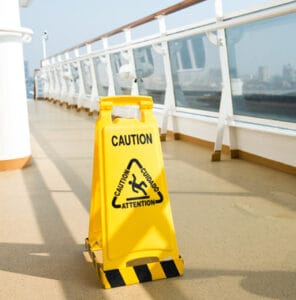
Cruise Ship Injuries
It is the responsibility of the captain or watercraft entity to keep all passengers and maritime workers safe. Cruise liners must exercise the highest degree of care to protect their passengers against physical harm. They also have an obligation to ensure their passengers arrive to port safely. Cruise lines require that all passengers agree to a “cruise contract” as part of their ticket purchase, yet most passengers do not read or understand this contract until it is too late. When the cruise liner fails to live up to their duty and a passenger is injured as a result, they may be liable for any resulting damages. And federal maritime law provides some protection for seamen under what is known as the Jones Act.

In fact, every ship or boat captain has a responsibility to operate their vessel and navigate the waters safely. The vessel owner and operator can be held liable for injuries and death that result from accidents they cause. Most cruise contracts contain damages limitations provisions that depend on where the cruise originates, terminates, and which ports the ship visits during its voyage. In general, there are three different categories: (1) cruises that call on a US port during its voyage; (2) cruises that stop at a port of a member nation of the European Union port during its voyage; and (3) cruises that neither touch a US or a EU port during the voyage.
Read more about, “Cruise Ship Injuries & Damages Caps – It’s not who you know, it’s where you go”
If you have suffered an accident or injury aboard a cruise ship or other watercraft, whether as a passenger or crewmember, we know how to protect your legal rights and maximize your recovery.

Types of Cruise Ship Injury Claims
- Slip and falls or trip and falls
- Falling overboard
- Injuries from fires on the cruise ship
- Norovirus infection (Norwalk virus) or other illnesses from contaminated food or unsanitary conditions
- Pool or water slide accidents
- Injuries sustained during on-shore excursions
- Injuries sustained during recreational activities aboard the ship
- Dock accidents
- Falling object accidents
- Injuries resulting from navigational errors
- Medical malpractice or medical negligence
- Sexual assault or physical assault because of unsecured or unsafe premises
The Jones Act provides for compensation for seamen for death or injuries they suffer during their employment on sea-going vessels or offshore oil rigs. The term “seaman” applies to people who work aboard most types of commercial vessels, including cruise ships, cargo ships, water taxis, charter boats or yachts, fishing boats, oil rigs, tankers, and other watercraft as well as divers working under water.
Injuries covered under the Jones Act include:
- traumatic brain injury
- anoxic brain injury
- spinal cord injury
- amputation
- fractures
- orthopedic injuries
- death
If you or someone you love has suffered an injury on a cruise ship, boat or other water vessel, please call Friedman|Rubin, PLLP today at (206) 501-4446 for a free consultation or fill out our online contact form.
If you are a lawyer seeking assistance with a serious personal injury case, consider partnering with us. We list our co-counsel as references on our verdicts and settlements page. Feel free to contact any of them for their opinion of Friedman|Rubin, PLLP.
